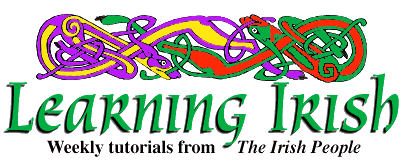
Irish Lesson 3
|
One of the characteristics of modern printed Irish is the frequency of the letter "h" after consonants in words. Generally the "h" is not sounded by itself but instead indicates a pronunciation change in the consonant directly ahead of it. This change, called "aspiration", occurs in other languages, too. In English, for example, you know that the word "philosophy" is pronounced with "f" sounds, not "p" sounds. The "h" after the "p" tells you this, as it does in "Philip" and "triumph." A German pronounces "ach" differently from "ac" or "ak", too, because he knows that the "h" indicates a change, which we call "aspiration" in Irish. Aspiration is nothing more than a relaxation of the tongue as you say a consonant, so that air can flow out of the mouth more easily. Aspiration can occur for initial consonants under the effect of preceding words or word groups, such as "my" or "in the". Aspiration can also occur in the middle or at the end of a word. We will now give you an "aspiration vocabulary," so that you will be able to pronounce aspirated consonants more easily as you read them. Nearly all the aspirated sounds are close to English sounds, but the aspirated "c" sounds are somewhat different. Learn them separately first: When ordinary, unaspirated "c" is next to "a", "o", or "u", pronounce it like the "c" in "coat" or "coal." This is called "broad c." Notice that your tongue rises at the back and touches the roof of your mouth for the "c" sound. Try these Irish words: cáil (kaw*l), cóta (KOH-tuh), cúpla (KOOP-luh). To make the aspirated sound, pronounce the "c" without letting the tongue rise so high. Try the German word "ach" first. Then try the aspirated sounds in: lach (lahk*), loch (lohk*), dúchas (DOOK*-uhs). Next, try the sound at the start of words: cháil (k*aw*l), chóta (K*OH-tuh), chúpla (K*OOP-luh). We will use the symbol (K*) for the aspirated "broad c" sound. Pronounce "c" next to "e", "i", or before "ea" like the "k" in "kill" or "kit". Notice that the tongue top touches the roof of the mouth farther forward than for "broad c." Try these Irish words: ceil (kel), cíos (kees), ceannaigh (KAN-ee). To aspirate, say the "c" without letting the tongue touch the roof of the mouth. The sound will be like a "y" in English with a slight "h" sound before it; we will use (hy) as the symbol. Try: cheil (hyel), chíos (hyees), cheannaigh (HYAN-ee). In parts of Ireland, the sound is closer to English "h." Now learn this aspiration vocabulary. ("Mo" means "my" and aspirates the nine aspirable consonants after it.):
béal, mo bhéal (bay*l, muh VAY*L) mouth, my mouth.
cistin, mo chistin (KISH-tin, muh HYISH-tin) kitchen, my kitchen.
deis, mo dheis (desh, muh YESH) opportunity, my opportunity.
fear, mo fhear (far, mar) man, my man.
géag, mo ghéag (GAY*-ugh, muh YAY*-uhg) arm, my arm.
mian, mo mhian (MEE-uhn, muh VEE-uhn) wish, my wish.
peata, mo pheata (PAT-uh, muh FAT-uh) pet, my pet.
séire, mo shéire (SHAY*-ruh, muh HAY*-ruh) supper, my supper.
tír, mo thír (teer, muh HEER) country, my country.
Conversation Séamas: (SHAY*-muhs): Dia duit, a Nóra (DEE-uh git, uh NOH-ruh) Hello, Nora. Nóra: Dia's Muire duit, a Shéamais (DEE-uhs MWIR-uh git, uh HAY*-mish) Hello James. Séamas: Conas tá tú inniu? (KUN-uhs TAW* too in-YOO) How are you today? Nóra: Tá mé go maith, agus conas tá tú féin? (TAW* may* goh MAH, AH-guhs KUN-uhs TAW* too fay*n) I am well, and how are you yourself? Séamas: Tá mé go maith leis, ach níl mé ag obair anois (TAW* may* go MAH lesh, ahk* NEEL may* eg UH-bir uh-NISH) I am well, too, but I am not working now. Nóra: Níl an aimsir go maith inniu (neel un EYEM-sheer goh MAH in-YOO) The weather isn't good today. Séamas: Tá an ceart agat. Tá sé fuar anseo (taw* un KART uh-GUHT. taw*shay* FOO-uhr uhn-SHUH FRESH-in) You're right. It is cold here too). Nóra: Níl an seomra te, pé scéal é (neel un SHOHM-ruh shuh te, pay* SHKAY*L ay*) The room isn't warm. anyway. (c) 1997 The Irish People. May be reprinted with credit. |